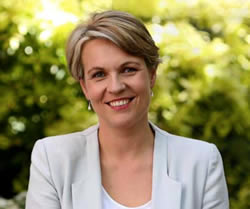Kerri Sackville* says Tanya Plibersek’s decision not to run for the Labor leadership highlights the challenges female politicians face that their male counterparts do not.
 Tanya Plibersek (pictured) has decided not to run for the Labor leadership, citing the challenges of balancing work and family.
Tanya Plibersek (pictured) has decided not to run for the Labor leadership, citing the challenges of balancing work and family.
At this point, she wrote in a statement, she “cannot reconcile the important responsibilities I have to my family with the additional responsibilities of the Labor leadership”.
Plibersek is married with three children, the youngest of whom is only eight years old.
In a tweet about the decision, Sky news reporter Laura Jayes wrote: “I can barely get my head around what kind of energy, organisation, passion and commitment it must take to juggle a political career and a young family.”
“Tanya Plibersek has been doing that for two decades.”
“Let that sink in.”
The tweet was incredibly revealing, less for Jayes’ sentiment (which I echo) and more for the replies that followed.
“Give me a break. Thousands and thousands of women juggle families around careers every day,” posted one commenter.
“These other women don’t have staff, advisers, nannies and the budget of the taxpayer to get them through.”
“So does [sic] millions of Australian battlers,” wrote another.
“She owns four houses and is a multimillionaire. Spare me.”
As a woman of a similar age to Ms Plibersek, and a mother of three myself, I agree with Jaye.
Working full-time while raising kids is incredibly stressful, no matter how much money one has for staff and nannies.
But what the commenters have missed in their criticism of Ms Plibersek is that it is about more than the hours, and it is about more than the money.
It’s about what politics does to the players in this country, and, particularly, to women.
And it’s about the fundamental difference between most senior male politicians in Australia, and most females.
Politics is a dirty game.
Male and female politicians in this country are subject to a barrage of attacks and criticisms from the media, from the public, and, most significantly, from each other in Parliament.
They are subject to leadership spills and leaks and speculation and conspiracy theories and endless, endless scrutiny.
Being a politician is not your average “battler” job.
Being the Labor leader and a parent is not your average career juggle.
Politicians require a resilience and thickness of skin that we lay people do not need.
And for women, there are unique and profound challenges.
For a start, female politicians are in a significant minority in Australian politics, making up just 35 per cent of the Federal Government.
Senior female politicians are subject to a particular type of scrutiny to which male politicians are not.
There is commentary on their appearance, their clothing, their attractiveness, and, of course, their life choices regarding marriage and reproduction.
And within Parliament there is a well-documented culture of sexism.
Think of the slurs thrown at Senator Sarah Hanson-Young by former Senator David Leyonhjelm, the relentless misogyny faced by Julia Gillard during her time as Prime Minister, and the gendered bullying in Parliament called out by female politicians.
A woman can perform the role of leader of the Labor Party as well as or better than a man.
Jacinda Ardern is doing a spectacular job as New Zealand Prime Minister.
But the pressures on women in politics are extreme, and without significant support at home the burden would become untenable.
Most, if not all, senior male politicians have stay-at-home wives who look after them and their kids.
Ms Gillard had a largely stay-at-home partner during her time in office.
Ms Ardern’s partner is currently looking after their baby full-time.
Perhaps Ms Plibersek would have run for office had she had a stay-at-home partner who would support her and her kids.
Unfortunately, like the vast majority of women in the workforce — and unlike the vast majority of senior male politicians — she does not.
What sets most female politicians aside from their male counterparts is partly the gendered scrutiny and bullying they face.
What also sets them aside is their lack of that great secret weapon of the high-powered politician: a stay-at-home partner.
I regret Plibersek’s decision not to run for Labor leader, but I do not judge it.
Politics for women in this country is a brutal business.
We need to change our culture to make politics amenable to women, rather than the other way around.
* Kerri Sackville is an Australian author and journalist. She tweets at @KerriSackville and her website is kerrisackville.com.au.
This article first appeared at www.news.com.au.


